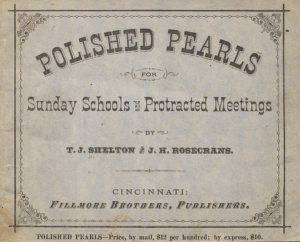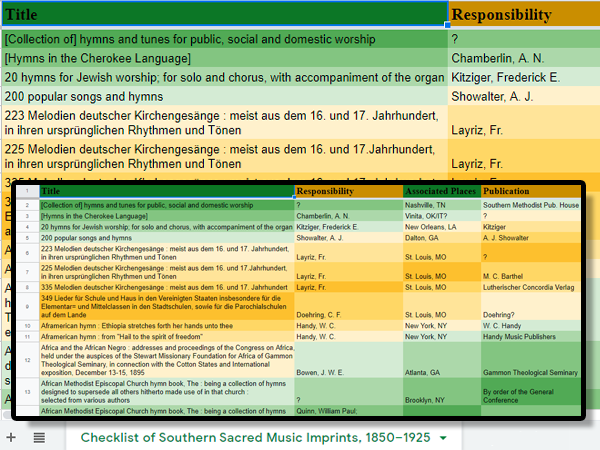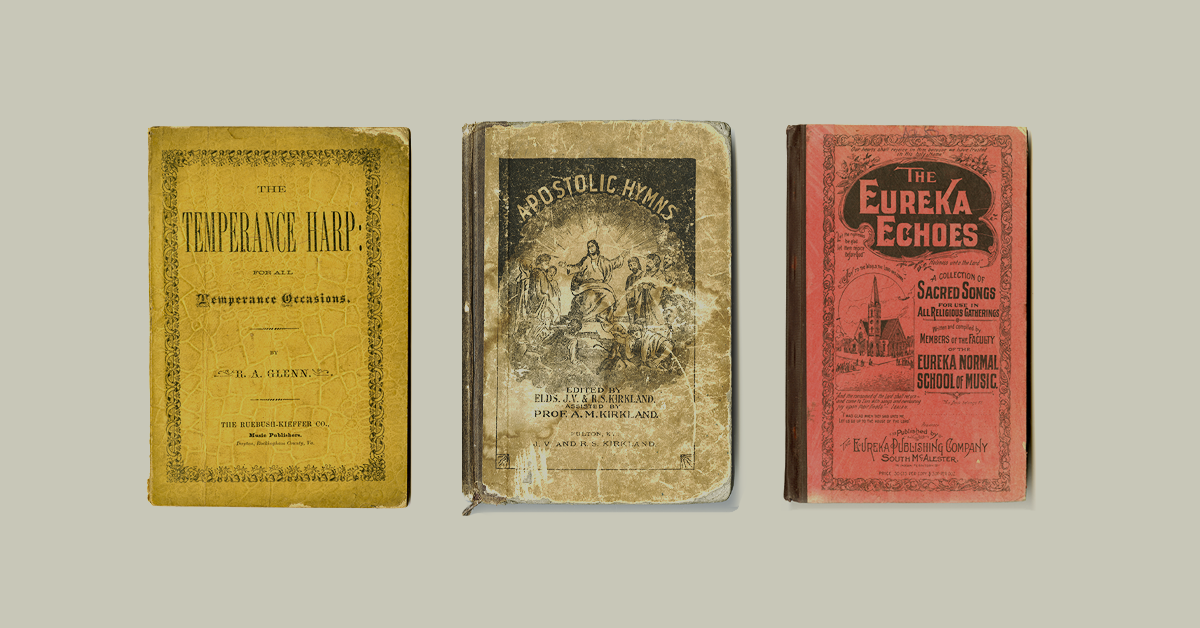 The Sounding Spirit team is delighted to announce the launch of its inaugural digital library. The product of a one-year NEH Humanities Collections and Reference Resources Foundations grant, the pilot digital library features songbooks and hymnals published across the US South from 1850 to 1925. Project director and editor-in-chief Jesse P. Karlsberg hopes that the digital library will increase the visibility of and engagement with significant songbooks that remain undervalued in the study of American sacred music. A federated collection spanning holdings from four partner archives, the Sounding Spirit digital library features twenty-two books of vernacular sacred music including words-only hymnals, gospel songbooks, spirituals collections, and shape-note tunebooks. Curated into collections that highlight people, places, genres, and denominational affiliations of American sacred music, the digital library allows for dynamic interaction with songbooks and hymnals seminal in their respective eras, but historically underrepresented in both archival holdings and scholarship.
The Sounding Spirit team is delighted to announce the launch of its inaugural digital library. The product of a one-year NEH Humanities Collections and Reference Resources Foundations grant, the pilot digital library features songbooks and hymnals published across the US South from 1850 to 1925. Project director and editor-in-chief Jesse P. Karlsberg hopes that the digital library will increase the visibility of and engagement with significant songbooks that remain undervalued in the study of American sacred music. A federated collection spanning holdings from four partner archives, the Sounding Spirit digital library features twenty-two books of vernacular sacred music including words-only hymnals, gospel songbooks, spirituals collections, and shape-note tunebooks. Curated into collections that highlight people, places, genres, and denominational affiliations of American sacred music, the digital library allows for dynamic interaction with songbooks and hymnals seminal in their respective eras, but historically underrepresented in both archival holdings and scholarship.
- Link to Sounding Spirit Digital Library: https://library.soundingspirit.org/
The Emory Center for Digital Scholarship (ECDS) collaborated on this pilot library with four partner archives whose holdings complement Sounding Spirit’s research focus: Pitts Theology Library at Emory University, the John Jacob Niles Center for American Music at the University of Kentucky, the Southern Baptist Theological Seminary Archives and Special Collections, and the Center for Popular Music at Middle Tennessee State University. Center for Popular Music director Greg Reish describes the value of the pilot library’s collaborative approach to digital collection development:
“The Center for Popular Music is proud to be one of the archives participating in the Sounding Spirit project. With the current increase in digital access to archival materials, Sounding Spirit does more than simply put materials online. It combines innovative technology with solid research principles and a wealth of expertise to make early American religious songbooks available to scholars and musicians, encouraging their use, fostering new insights, and facilitating a more informed cultural history of American hymnody. The project stands to become a model for collaborative digital scholarship as remote access to archives becomes more and more essential to the way scholars work in the twenty-first century.”
In addition to collaborating with collection stewards and center directors on library content, the planning grant made possible an engaged dialogue across institutional lines about both access and barriers to digital technologies, best practices for digitization and preservation, and strategies for representing the complex interplay in these songbooks between text and music through optical character recognition (OCR). Sounding Spirit staff worked with archivists and digitization specialists at all partner archives to build workflows responsive to individual capacity while respecting project specifications. University of Kentucky’s Director of Digital Services Sarah Dorpinghaus notes the importance of the project’s research into inter-institutional digital workflows:
“Cultural heritage institutions constantly strive to increase and improve online access to their materials, yet we often don’t have the capacity to build and support specialized digital repositories on our own. Therefore, collaborative projects, like Sounding Spirit, that leverage subject and technical expertise are crucial. We learn so much from working closely together to explore new ideas and techniques. Ultimately this results in more efficient workflows and tools behind the scenes and an improved digital access experience for the public.”
 This digital library is part of the ECDS’s Sounding Spirit initiative, a research lab and publishing collaborative that encourages engagement with American sacred songbooks. In addition to developing thematic collections, Sounding Spirit is publishing groundbreaking print and digital annotated facsimile editions of key southern songbooks in partnership with the University of North Carolina Press. Five forthcoming editions complement this library’s collections of southern vernacular songbooks by exemplifying how rich scholarly engagement with these texts shifts our understanding of American music history.
This digital library is part of the ECDS’s Sounding Spirit initiative, a research lab and publishing collaborative that encourages engagement with American sacred songbooks. In addition to developing thematic collections, Sounding Spirit is publishing groundbreaking print and digital annotated facsimile editions of key southern songbooks in partnership with the University of North Carolina Press. Five forthcoming editions complement this library’s collections of southern vernacular songbooks by exemplifying how rich scholarly engagement with these texts shifts our understanding of American music history.
Sounding Spirit’s digital library and editions are built using the Readux platform. A research and publishing tool, Readux foregrounds volumes’ visual appearance, retaining a given book’s format, design, and typography as well as its textual content. Readux also facilitates research, teaching, and publishing with digitized books from diverse archival locations. Karlsberg, product owner of Readux and Senior Digital Scholarship Strategist at the ECDS, sees Readux as the ideal platform to help communicate the broad impact of the sacred songbooks at the core of the Sounding Spirit initiative:
“By providing an elegant interface for seamlessly viewing digitized books hosted by diverse institutions, Readux facilitates our project’s goal of placing these underappreciated and inaccessible works in the hands of singers, teachers, and scholars. Through its annotation and publishing capabilities, Readux also provides users with the tools they need to reinscribe these works in the stories we tell about American music.”
The Sounding Spirit team and partner archives are already at work on the next phase of the digital library, planning to digitize hundreds of volumes identified during this planning grant process. Music bibliography associate Erin Fulton directed the compilation of the “Checklist of Southern Sacred Music Imprints, 1850–1925” that will guide the next phase of the project. As a dataset, the checklist already offers rich opportunities for researching the contours of American sacred songbook publishing. In addition to assembling basic bibliographic data otherwise dispersed across the catalogs of numerous repositories, the checklist includes data points that standard catalog records do not encompass. For instance, information about denominational orientation, known distributors, and notation style is clearly indicated wherever discernible. A user intrigued by the “scientific” music found in George F. Root’s widely-attested The Prize (1870) can easily discover more obscure titles exemplifying the same style, like Lemuel C. Everett’s Thesaurus Musicus (1856).

The team also plans to incorporate lesson plans and teaching materials for a variety of learning levels, scholarly essays, and data visualizations about the site’s songbooks into the expanded Sounding Spirit digital library site. Derrick Fox, advisory board member and director of choral activities and associate professor of music at the University of Nebraska-Omaha, emphasizes the project’s pedagogical value:
“The Sounding Spirit Digital Library is an invaluable resource for educators of all levels who are looking to learn more and teach about communal music making in the United States. This collection of diversified repertoire includes music by communities that have been deleted or omitted from mainstream musical sources and the music in this library is readily available for sight reading, performances or enrichment activities in your rehearsals and classrooms.”
Sounding Spirit invites audiences to begin exploring the initial batch of songbooks in the pilot digital library. Scholars, educators, and practitioners of all kinds are welcome! The project team hopes users will take full advantage of the platform’s features to engage the texts and textual communities whose publishing histories and singing practices can reframe our understanding of American sacred music—one text at a time.
